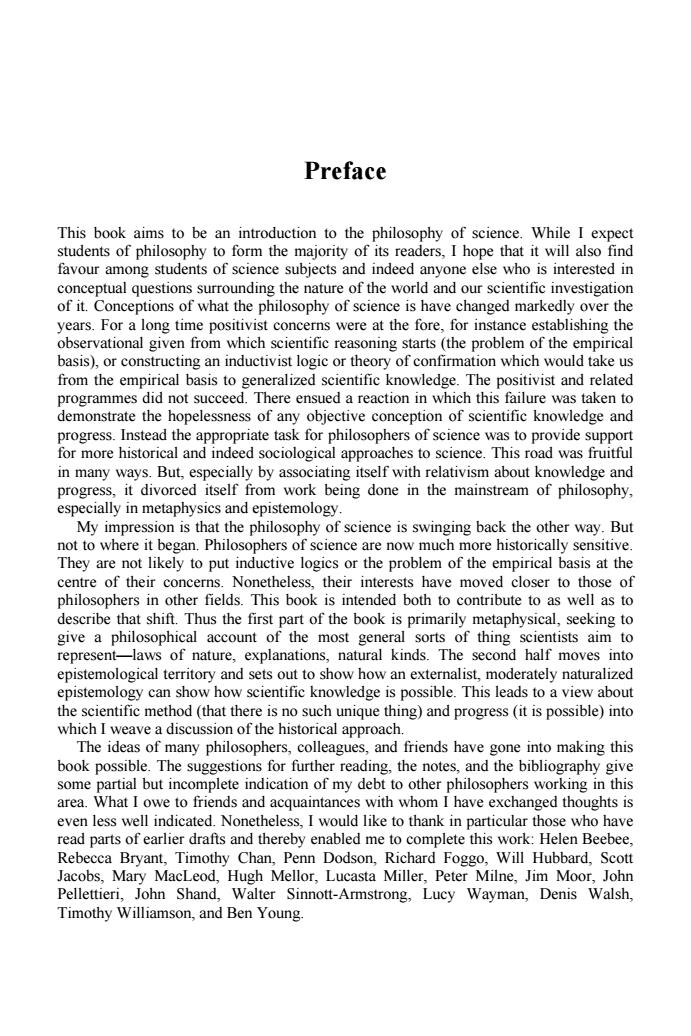正在加载图片...

Preface This book aims to be an introduction to the philosophy of science.While I expect students of philosophy to form the majority of its readers,I hope that it will also find favour among students of science subjects and indeed anyone else who is interested in conceptual questions surrounding the nature of the world and our scientific investigation of it.Conceptions of what the philosophy of science is have changed markedly over the years.For a long time positivist concerns were at the fore,for instance establishing the observational given from which scientific reasoning starts(the problem of the empirical basis),or constructing an inductivist logic or theory of confirmation which would take us from the empirical basis to generalized scientific knowledge.The positivist and related programmes did not succeed.There ensued a reaction in which this failure was taken to demonstrate the hopelessness of any objective conception of scientific knowledge and progress.Instead the appropriate task for philosophers of science was to provide support for more historical and indeed sociological approaches to science.This road was fruitful in many ways.But,especially by associating itself with relativism about knowledge and progress,it divorced itself from work being done in the mainstream of philosophy, especially in metaphysics and epistemology. My impression is that the philosophy of science is swinging back the other way.But not to where it began.Philosophers of science are now much more historically sensitive. They are not likely to put inductive logics or the problem of the empirical basis at the centre of their concerns.Nonetheless,their interests have moved closer to those of philosophers in other fields.This book is intended both to contribute to as well as to describe that shift.Thus the first part of the book is primarily metaphysical,seeking to give a philosophical account of the most general sorts of thing scientists aim to represent-laws of nature,explanations,natural kinds.The second half moves into epistemological territory and sets out to show how an externalist,moderately naturalized epistemology can show how scientific knowledge is possible.This leads to a view about the scientific method (that there is no such unique thing)and progress(it is possible)into which I weave a discussion of the historical approach. The ideas of many philosophers,colleagues,and friends have gone into making this book possible.The suggestions for further reading,the notes,and the bibliography give some partial but incomplete indication of my debt to other philosophers working in this area.What I owe to friends and acquaintances with whom I have exchanged thoughts is even less well indicated.Nonetheless,I would like to thank in particular those who have read parts of earlier drafts and thereby enabled me to complete this work:Helen Beebee, Rebecca Bryant,Timothy Chan,Penn Dodson,Richard Foggo,Will Hubbard,Scott Jacobs,Mary MacLeod,Hugh Mellor,Lucasta Miller,Peter Milne,Jim Moor,John Pellettieri,John Shand,Walter Sinnott-Armstrong,Lucy Wayman,Denis Walsh, Timothy Williamson,and Ben Young.Preface This book aims to be an introduction to the philosophy of science. While I expect students of philosophy to form the majority of its readers, I hope that it will also find favour among students of science subjects and indeed anyone else who is interested in conceptual questions surrounding the nature of the world and our scientific investigation of it. Conceptions of what the philosophy of science is have changed markedly over the years. For a long time positivist concerns were at the fore, for instance establishing the observational given from which scientific reasoning starts (the problem of the empirical basis), or constructing an inductivist logic or theory of confirmation which would take us from the empirical basis to generalized scientific knowledge. The positivist and related programmes did not succeed. There ensued a reaction in which this failure was taken to demonstrate the hopelessness of any objective conception of scientific knowledge and progress. Instead the appropriate task for philosophers of science was to provide support for more historical and indeed sociological approaches to science. This road was fruitful in many ways. But, especially by associating itself with relativism about knowledge and progress, it divorced itself from work being done in the mainstream of philosophy, especially in metaphysics and epistemology. My impression is that the philosophy of science is swinging back the other way. But not to where it began. Philosophers of science are now much more historically sensitive. They are not likely to put inductive logics or the problem of the empirical basis at the centre of their concerns. Nonetheless, their interests have moved closer to those of philosophers in other fields. This book is intended both to contribute to as well as to describe that shift. Thus the first part of the book is primarily metaphysical, seeking to give a philosophical account of the most general sorts of thing scientists aim to represent—laws of nature, explanations, natural kinds. The second half moves into epistemological territory and sets out to show how an externalist, moderately naturalized epistemology can show how scientific knowledge is possible. This leads to a view about the scientific method (that there is no such unique thing) and progress (it is possible) into which I weave a discussion of the historical approach. The ideas of many philosophers, colleagues, and friends have gone into making this book possible. The suggestions for further reading, the notes, and the bibliography give some partial but incomplete indication of my debt to other philosophers working in this area. What I owe to friends and acquaintances with whom I have exchanged thoughts is even less well indicated. Nonetheless, I would like to thank in particular those who have read parts of earlier drafts and thereby enabled me to complete this work: Helen Beebee, Rebecca Bryant, Timothy Chan, Penn Dodson, Richard Foggo, Will Hubbard, Scott Jacobs, Mary MacLeod, Hugh Mellor, Lucasta Miller, Peter Milne, Jim Moor, John Pellettieri, John Shand, Walter Sinnott-Armstrong, Lucy Wayman, Denis Walsh, Timothy Williamson, and Ben Young